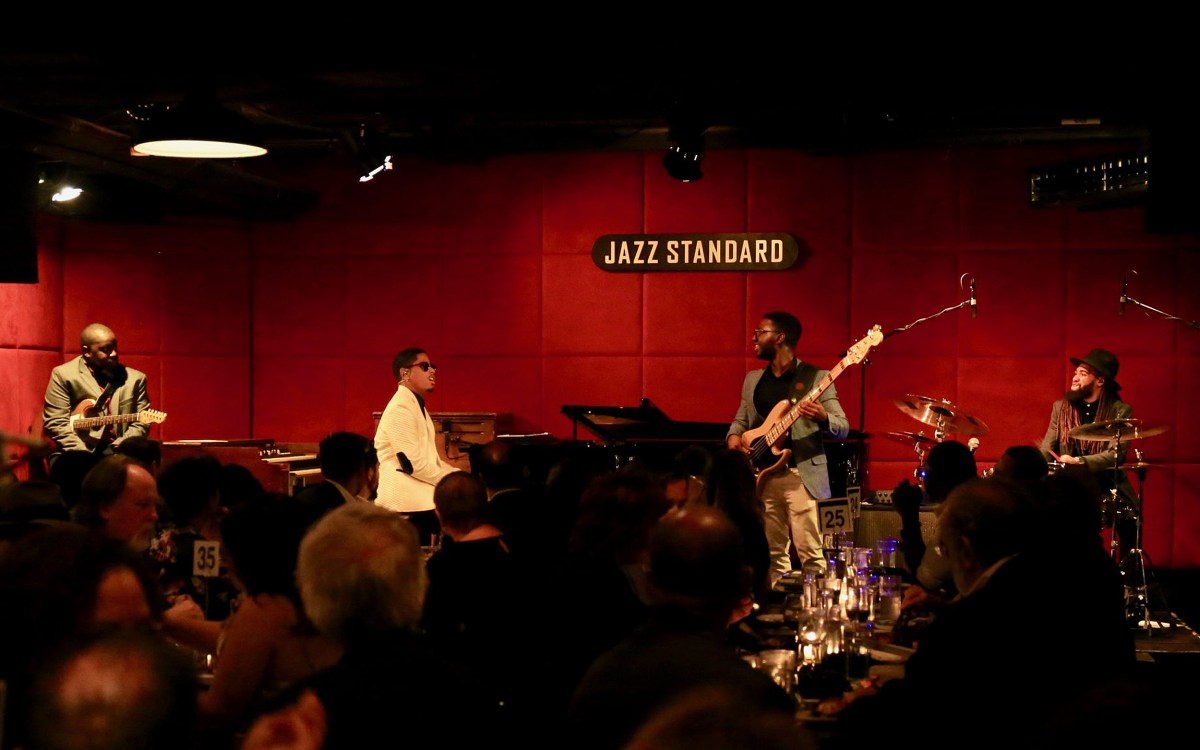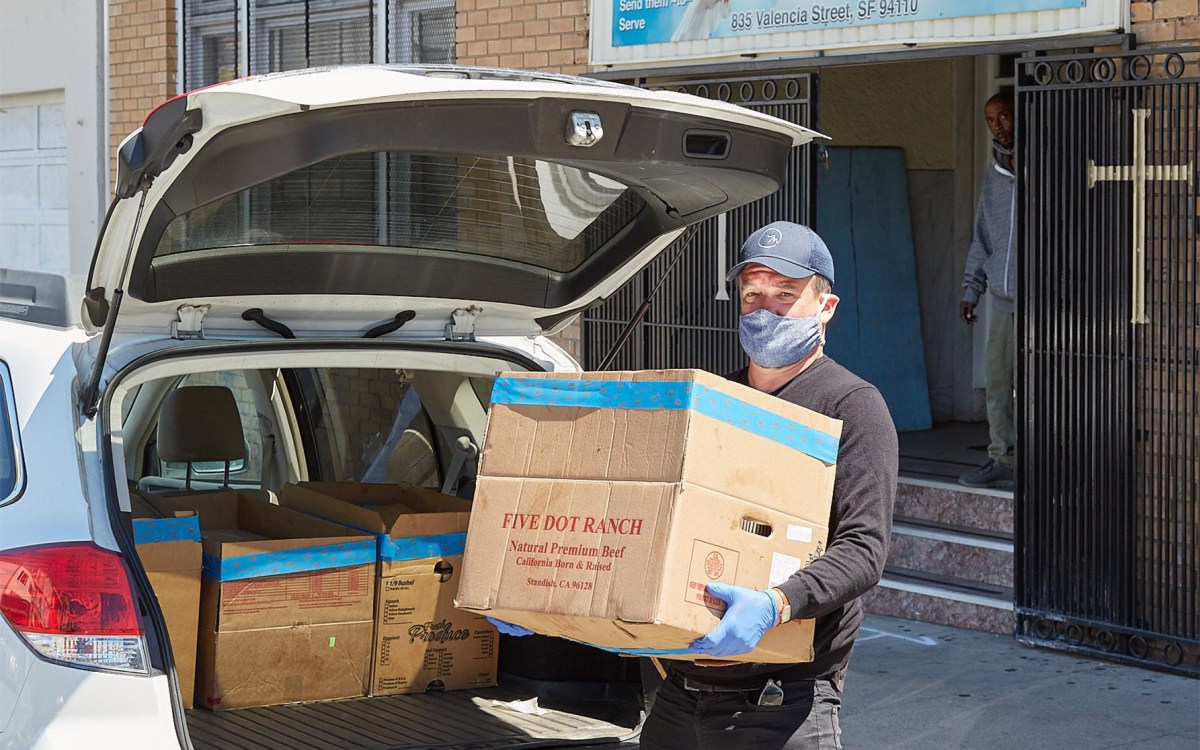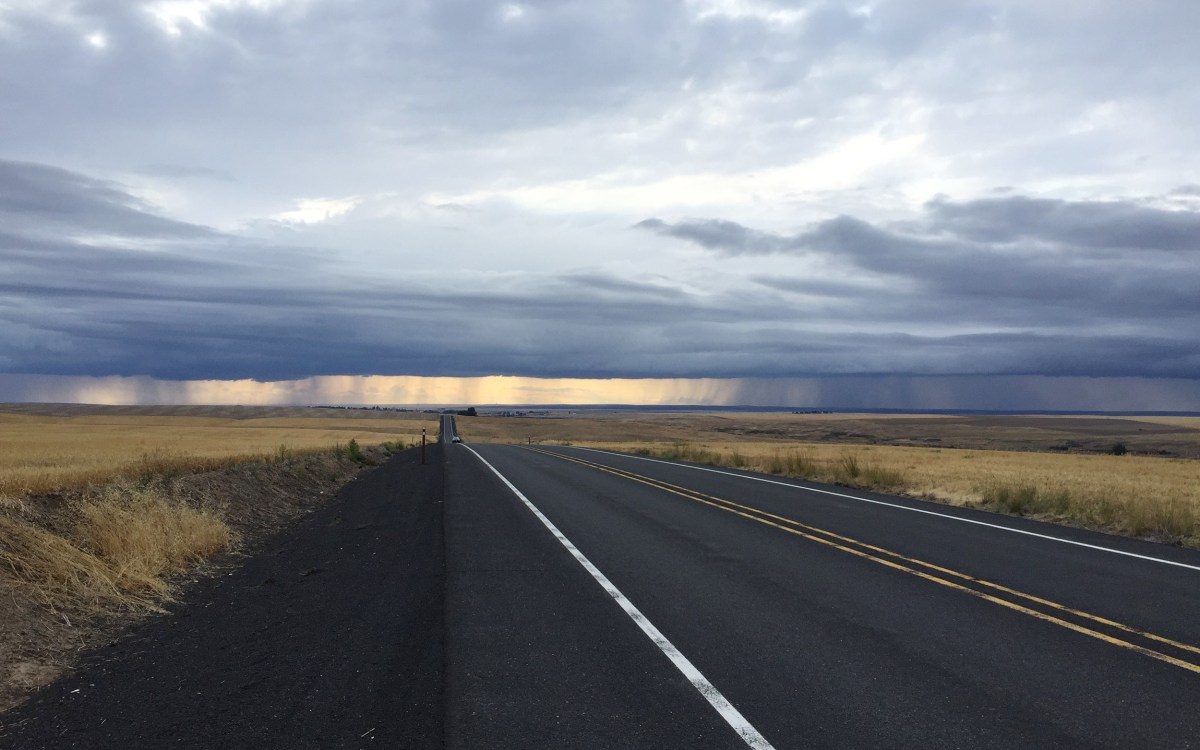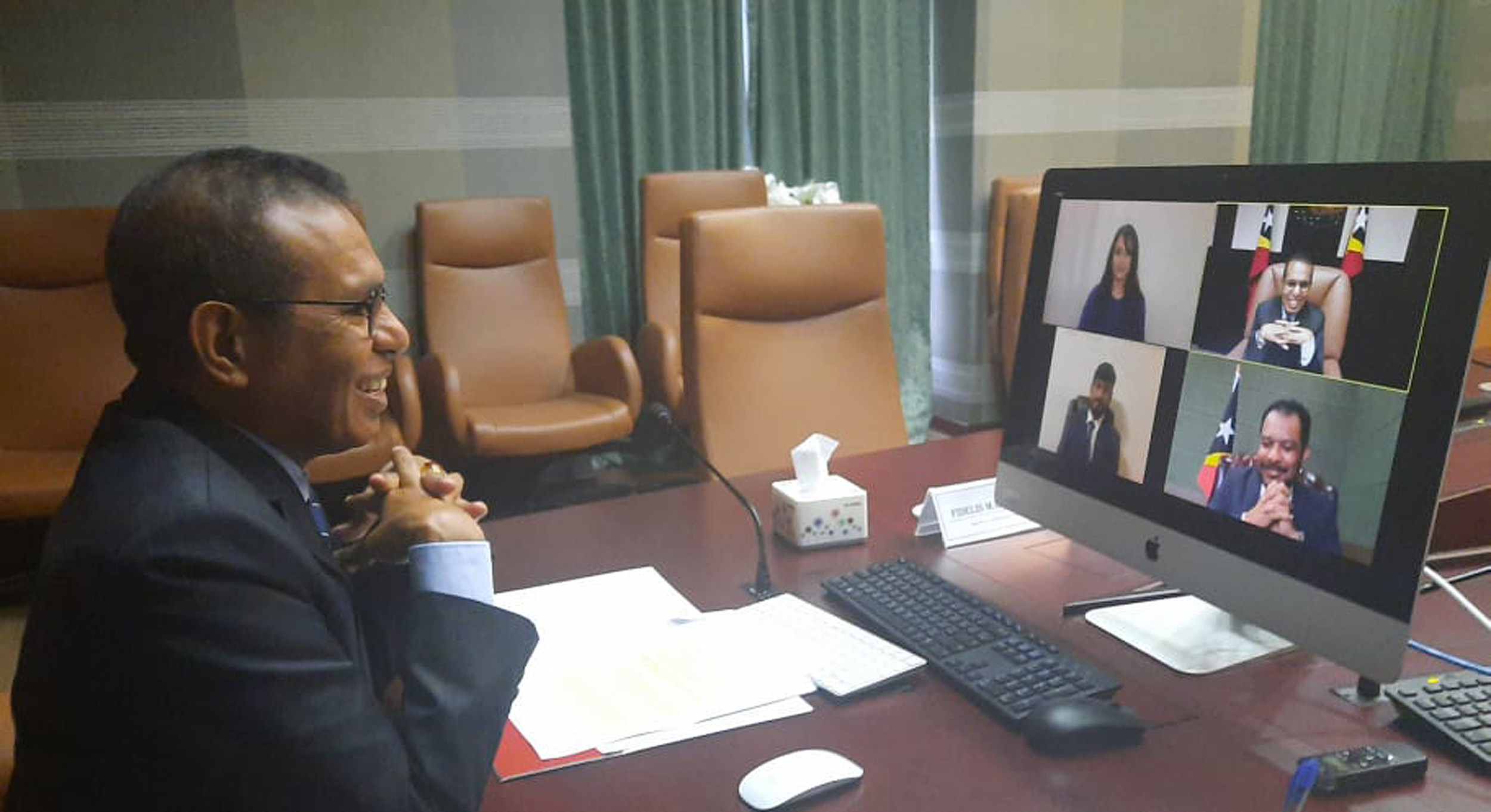
Timor-Leste’s prime minister Taur Matan Ruak during a Bridging Borders interview.
Photos courtesy of Henna Hundal
Talking pandemic across borders
Alumni create project to discuss and support responses around the world
When the COVID-19 pandemic hit, leaders around the world scrambled to develop policies to protect their citizens, with varying degrees of success.
Incoming Harvard Medical School student Sai Rajagopal ’20 started doing research into why it seemed that his native Canada was doing better than the U.S. “I noticed that in Canada they were implementing stricter lockdowns and achieving better epidemiological outcomes than in the U.S. I wondered, ‘What if we could bring some of these other countries’ COVID-19 responses to American listeners so they could see for themselves what is working and what isn’t,’” he said in an interview with SEAS.
That led Rajagopal and his friend Henna Hundal ’19 to create the Bridging Borders Project, an online platform to assemble the perspectives of world leaders and exchange health policy ideas.
Since May the pair have interviewed leaders and policy makers over Zoom in a Q&A format and posted the 15-minute edited recordings to the Bridging Borders website. More than a dozen episodes are currently available. Guests include presidents, prime ministers, and other policy leaders from different countries and territories across the globe.
During interviews with several different prime ministers of the Caribbean Community (CARICOM) member states, for instance, Hundal and Rajagopal said they noticed a common theme of mask-distribution challenges. And they proposed a solution to address them.
“We followed up with recommendations for inter-island mask-distribution schemes that aligned with CARICOM ‘travel bubbles,’ which were implemented to kickstart the tourism-based economies,” Hundal said, referring to agreements that ease travel between neighboring countries.
Hundal said she and Rajagopal realized that the lack of communication was a major problem playing out on all levels from global to local. Hundal grew up in a family of immigrant almond farmers in Turlock, Calif., and was struck by the stark difference between the pandemic response in her hometown and in Boston. In Hundal’s experience, smaller communities like hers do not always share accurate information, and information coming from mainstream media is not always trusted.
“I thought this insight into the discrepancies so early in the pandemic was a sobering perspective,” she said. “[I wanted to] get a taste of a more comprehensive look from policymakers. … We’re hoping we bring that sober, responsible perspective to the programming.”
One of the project’s goals is to amplify the concerns of communities that are disproportionately affected by the pandemic, such as the Navajo Nation, where 30 percent of households don’t have access to running water, making COVID preventative measures like regular hand washing a widespread challenge. By highlighting these disparities, Hundal and Rajagopal said they hope to connect communities to stakeholders who can invest in pandemic relief.
Jonathan Nez, president of the Navajo Nation, said during an interview that Indigenous communities were fighting to receive their promised pandemic relief funding from the federal CARES Act. In response, Hundal and Rajagopal advocated for the Navajo Nation COVID-19 Response Donation Fund across social media.
“We bring international attention to the [grass-roots] initiatives of the communities we feature because we believe they best know how to allocate their own fundraising dollars,” Hundal said.
Hundal and Rajagopal build on-the-ground contacts with government officials, and guests often reach out to suggest other potential subjects. The leaders with whom they share data in turn contextualize it with what’s going on in the region.
“We drill it down to three questions we want to know more about,” Rajagopal said. “They’re deeper questions that present a narrative of how the government is facing the pandemic.”
Henna Hundal (left), Sai Rajagopal, and Prime Minister Tshering during an interview.
Photo courtesy of Henna Hundal
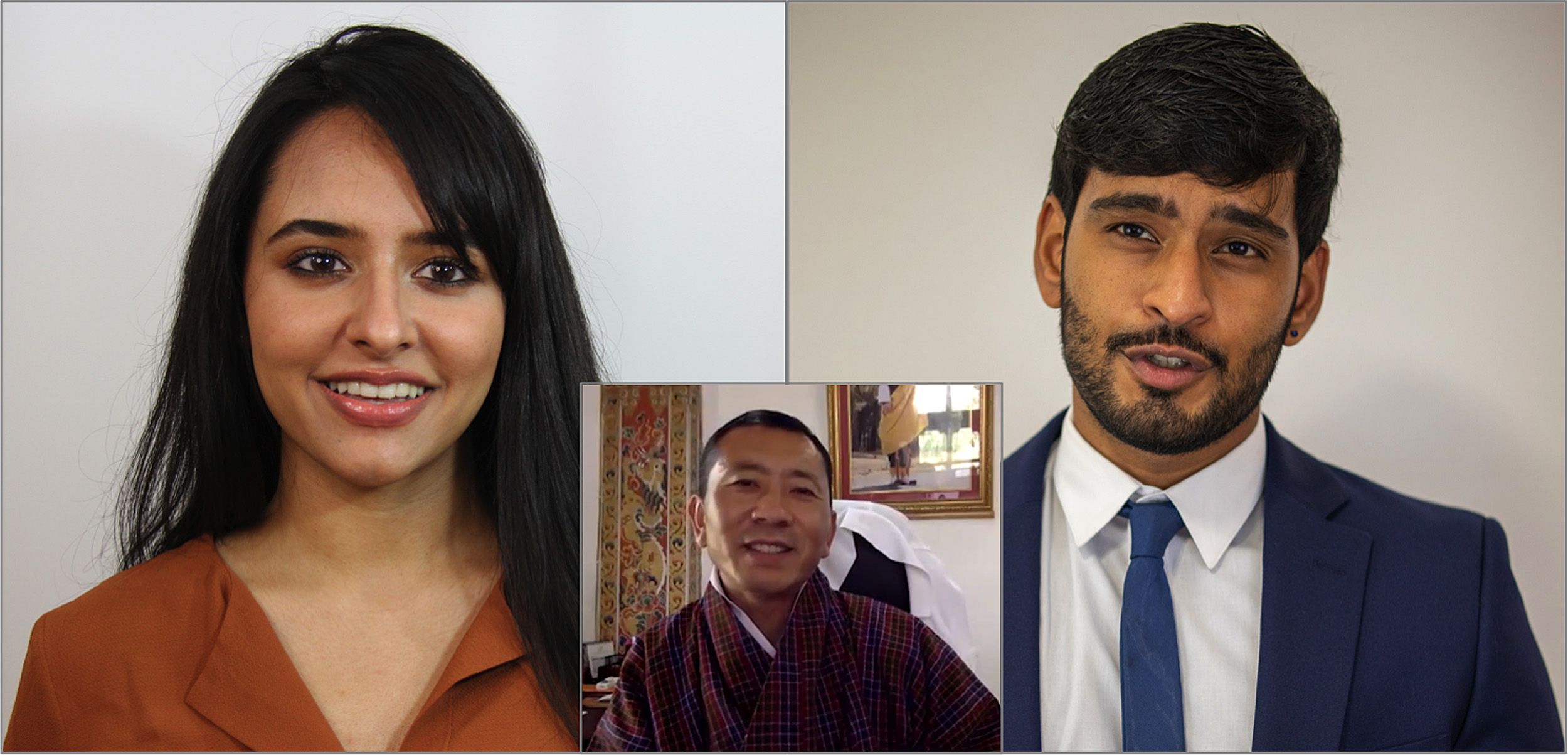
Guests share their perspectives on their COVID-19 response, such as Prime Minister Lotay Tshering of Bhutan, a neurologist who works as a physician on the weekends and develops policy during the weekdays. He believes that medical professionals should have a more prominent role in managing the pandemic than politicians do.
“The former [profession] impacts the latter,” Hundal said. “He lives it; he’s in the line of fire.”
Leaders also have to confront the realities of economies, such as those in the Caribbean, which rely heavily on tourism. In his interview, Prime Minister Gaston Browne of Antigua and Barbuda proposed a reparations model. Because the U.S. was partially built with slave labor from the region and the repercussions are ongoing, the nation should consider providing monetary aid to help during the pandemic, he argues.
“It’s an inescapable fact that a lot of wealth generated in the Caribbean is actually sent to North America and Europe to build the infrastructure, build the universities, and establish strong economies,” Browne said in his episode. “We were left poor and destitute. We think there should be some level of compensation, and I am one to believe there should be cash compensation.”
The two alumni hope that Bridging Borders will also serve as a touchpoint for Harvard researchers and academics focused on the pandemic, and direct them to the priorities of countries around the world, especially those facing structural issues.
“Many of the developing nations cannot abide by closing down their borders for a long time. When they’re faced with impossible choices, how do they make the best of their situations?”
Sai Rajagopal
“Our primary intention is to straddle the attention of government leaders and health care professionals and experts,” Hundal said. “Our episodes reveal many missed opportunities to bridge the divide between the two spheres of pandemic management.”
According to Hundal and Rajagopal, the project has also attracted Canada Research Chairs, affiliates of the Organization for Security and Co-operation in Europe, and health policy specialists across South Asia, the Caribbean, Africa, and Oceania. Following the interviews, Hundal and Rajagopal consulted with the countries to, using their own health policy backgrounds to support their pandemic initiatives or connect them to research groups and organizations best suited to help.
The project’s latest episode is an interview with the Prime Minister Silveria Jacobs of Sint Maarten and the pair are now working with that country to support its next phase of pandemic planning by connecting its leaders with intergovernmental resources.
“Many of the developing nations cannot abide by closing down their borders for a long time,” Rajagopal said. “When they’re faced with impossible choices, how do they make the best of their situations?”



